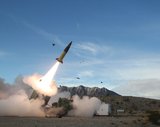DARPA, the Defense Advanced Research Projects Agency, has awarded BAE Systems’ FAST LabsTM research organisation a US$4 million contract for Phase 1 of its Artificial Intelligence Reinforcements (AIR) programme.
The AIR programme was devised with the intention of advancing dominant tactical autonomy in beyond-line-of-sight and beyond-visual-range air combat missions. Given the relative ubiquity of the aircraft in combat situations, the potential autonomy solutions devised by the AIR programme will be developed on F-16 testbeds.
Autonomy is frequently challenging, but delivering autonomy in the rapidly changing reality of fighter jet combat environments has proven especially difficult to deliver, primarily because of the potential for constantly changing four-dimensional data – all of which needs processing at speed and translating into combat action.
AI proves its mettle in AlphaDogfight
DARPA’s Air Combat Evolution programme (ACE) helped advance the science of fighter jet autonomy, running the first “Human vs AI” dogfight to take place in real airspace in 2023. That too was based on the characteristics of F-16 air combat, with a modified F-16 known as the X-62A or VISTA.
The goal of the ACE programme was to raise and predict human trust in autonomous flight systems in combat situations, although the position of armed forces around the world currently remains wedded to human-in-the-loop models.
The AIR programme takes the ACE goal further towards actively AI-supported or even AI-piloted fighter jets, by solving the problems of data processing, decision-making and combat action within the timeframe of traditionally human-piloted aircraft.
If DARPA can deliver the dominant tactical autonomy for which the AIR programme will strive, it will underline US and US-ally supremacy in the air.
BAE Systems said it will use machine learning (ML) to innovate simulation models of existing sensors, electronic warfare systems, and weapons within dynamic and operationally representative environments. ML techniques will also capture the underlying physics of aerial manoeuvres and systems.
Michael Planer, principal investigator at BAE Systems’ FAST Labs, summarised the approach the company would take to the AIR programme goals.
“Generating reliable, consistent air combat performance requires a vast amount of data and rapid, robust testing cycles,” Planer remarked. “Using ML, we will train the models used to make dynamic decisions, ensuring that the AI pilot is tested and trusted by human pilots.”






















